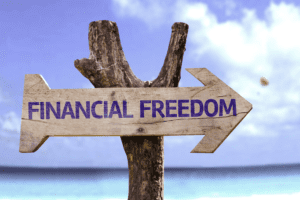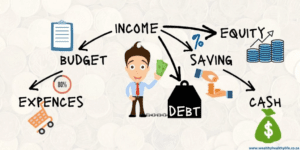Achieve Your Financial Independence
On 15th August we celebrate our nation’s declaration of freedom from the control and influence of Great Britain. Financial Independence also means freedom. Here’s how to declare, fight for, and win your own financial Independence Day.

What is financial independence?
A quick definition of financial independence could be having enough wealth to live a life of comfort without the need to work. In truth, financial independence can mean different things to different people.
Some people have no desire to ever quit working. They just want enough money to be comfortable and to have the ability to cover an emergency without going into debt. For others, financial independence means freedom from worry when they retire including the freedom to travel; spend time with family members; relax and enjoy the “fruits of their labour.” Others see it as being able to support themselves and be there for families who need them without worrying about being able to afford to help—or having enough to support the institutions and causes they value. Your definition could incorporate many of these goals.
The plans we’re discussing can help you build your way to financial independence. But it’s important to recognize that strategy and prudence can only go so far. Family responsibilities, health, personal circumstances, and social privilege—or the lack of it—play a large role in how free an individual is to build wealth and achieve financial independence.
Financial Objectives
Your financial objectives are unique to you. Think about your long-term goals. Do you want total financial independence—freedom from working for a living, and the ability to do as you please? Or are your objectives more modest? Are you OK with a mostly independent lifestyle with some need to supplement your passive income? Your age and financial situation will influence your choice of objectives.

If you are in your 20s or 30s, you have decades to achieve your goals along with the ability to take more risks. At that age, you may even want to pursue what’s known as the FIRE (Financial Independence, Retire Early) strategy, which involves an extreme savings and investment strategy designed to allow you to retire far earlier than normal.
If you are older, say between 50 and 65, you likely already have retirement savings objectives but even if not, there is still time to plan for financial independence. Depending on your goals and accumulated assets, this may involve a riskier investment strategy to make up for a lost time. Or you may need to reset what defines retirement comfort.
Assets
Which tools (weapons) will you need to achieve your objectives? These can include income-producing assets of many kinds—ranging from a savings account or CDs to a portfolio of dividend-paying stocks, bonds (or bond funds), and real estate.
A home is many people’s largest asset—and can turn into a source of equity or be used in a reverse mortgage to help fund retirement. And that’s not the only way to invest in real estate. Rental properties can generate significant amounts of cash flow but can require substantial investment and risk. REITs (real estate investment trusts) are another way to invest. The COVID-19 pandemic showed how real estate can both drop and grow in value over a short period. Over the long haul, however, real estate has shown itself to be a consistent provider of wealth.
Another wealth-building asset would be to start and run a successful business with the ultimate goal of either not being directly involved in day-to-day management or selling the business for a substantial profit.
Assets also include intangibles, such as knowledge and skill. You were not born knowing about the stock market, rental properties, or how to run a small business. You were born with the ability to learn, research, read, and experiment with different strategies to see what works.
Tactics
Your successful journey to financial independence depends a lot on your actions. These are the things you need to learn about and do to achieve financial independence as you define it.
Start with a budget that takes into account income and other available assets, allows you to pay your living expenses, and if at all possible, lets you save and invest. Think of your budget as a roadmap to financial independence. Pay attention to where the money goes and avoid dead ends. Cut costs where possible, creating more opportunities for saving and investment.
On the other hand, it’s important to allow for fun. Just don’t go overboard, do not borrow for recreation.
Along the same vein, expect the unexpected by creating an emergency fund to provide liquidity when you need it most for an unexpected (but necessary) expense. Planning for unexpected events that could derail your plans is crucial.
Finally, develop an investment strategy that takes advantage of the power of compound interest. Compound interest is free money and adds up over time.
Perseverance
You also need to be watchful about situations that could lead to having money trickle out that could be put to better use. Or that could lead to the accumulation of more debt than you can handle. If you feel it coming on, make yourself stop and pay attention, and work to find a solution, whether it’s debt counselling, debt consolidation, or even that old standby—putting the credit cards in a drawer and not using them. Keep looking for new opportunities and new ways to make the most of your hard-earned capital.
Perseverance also demands that you learn the steps for building a profitable investment portfolio and make sure that you rebalance it regularly to keep it moving toward your financial objectives. Then, adjust as you get closer to retirement.
Independence at Last
Sometimes success sneaks up on us. Striving for financial independence is not for everyone, but if you can achieve it, you’ll enjoy decades of financially-secure retirement.


